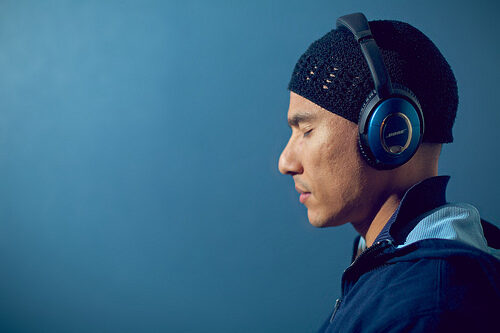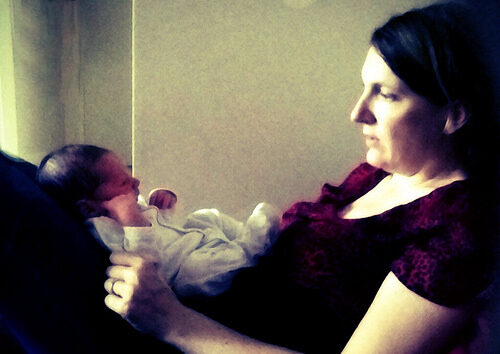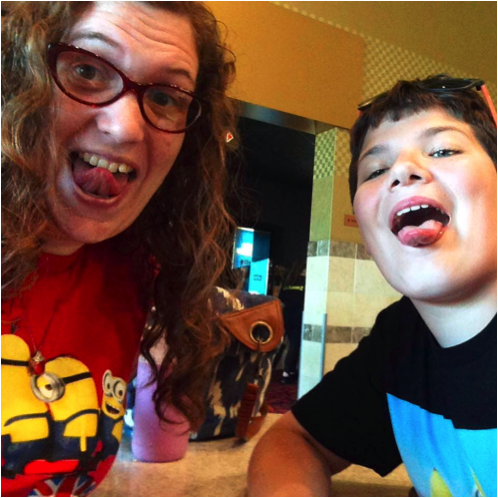TPGA is observing Autism Acceptance Month by featuring accounts from autistic people about the differences accommodations (or lack thereof) make in their lives. Today’s story is from Christine Langager, about being an autistic parent of an autistic child — and the frustration of often being excluded from autistic and autism-and-parenting communities when by definition one belongs to both. Christine Langager Photo © Christine Langager [image: Selfie of white woman with long braided light brown hair] As a child, I never fit in Always on the fringe, always looking in As an adult, it has always been more of the same Never fully clicking, but making my way I met the love of my life, and finally felt that I had a place to belong We started our family, and I looked forward to more ways to connect As our first son got older, his intensity was clear Play date invitations…
Tag: autism acceptance month
For someone like me—so sensitive to noise that I can actually perceive the bio-mechanical sounds of my own ears ringing aloud—my headphones are an incredible blessing.
Photo © Georgie Sharp. Creative Commons License. [image: Reclining white mother with dark hair, seen from the side, looking at an infant lying on her lap.] TPGA is observing Autism Acceptance Month by featuring accounts from autistic people about the differences accommodations (or lack thereof) make in their lives. Today’s story is from Autisticmotherland, on what professionals need to know about supporting — and diagnosing — autistic parents of autistic children. Autisticmotherland www.autisticmotherland.com In early March 2016 I spoke at the National Autistic Society’s Professional Conference on the topic of “Support and diagnosis of autistic mothers.” The talk and subject matter proved popular with the audience and I decided to write it up as a way to both summarise and explore the issues. The essay which follows is part of a three part linked series of blog posts (which I hope you will read!). This was and is my platform…
TPGA is observing Autism Acceptance Month by featuring accounts from autistic people about the differences accommodations (or lack thereof) make in their lives. Today’s story is from Mel Baggs, about the assumption that all kids should be able to work and play in groups — and that kids who can’t cope with group scenarios are just being difficult. Mel Baggs I see all these amazing programs for children Like really, really cool stuff, stuff that looks fun and educational at the same time, stuff that looks far more educational and far more rewarding than the school system, etc. I see them in documentaries, in videos online, in articles, etc. But then I’m always stopped short by something. Photo © Norton Gusky. Creative Commons License. [image: Schoolchildren of various races talking while gathered around a table.] Unless something fundamental changed about children between then and now. And in how children are…
TPGA is observing Autism Acceptance Month by featuring accounts from autistic people about the differences accommodations (or lack thereof) make in their lives. Today’s story is from Savannah Logsdon-Breakstone, about getting comfortable with asking for crucial accommodations — and setting one’s own boundaries about those supports. Savannah Logsdon-Breakstone crackedmirrorinshalott.wordpress.com When I first moved out, we didn’t realize that I needed the support that I do. I’ve talked about some of these things before on this blog, so I’m going to give each of them a paragraph. I understand general concepts around money management, but am unable to consistently apply it to my own life. (Example: I might need something but not get it, because I’m worried I won’t have enough money, even though it’s what the money is supposed to be there for.) Additionally, I have executive functioning issues that mean that making sure the right things happen at the right time…
Photo © Just Dining Chairs | Flickr / Creative Commons [Two taupe suede dining chair with blonde wood legs on a white background.] TPGA is observing Autism Acceptance Month by featuring accounts from autistic people about the differences accommodations (or lack thereof) make in their lives. Today’s example is from Aiyana Bailin, about how small accommodations changes, in this case choices regarding chairs, can have “huge results.” Aiyana Bailin restlesshands42.wordpress.com Once, at a convention of (mostly) autistic people, I observed a peculiar phenomenon. Chairs were arranged in a large circle, and perhaps 100 attendees gathered and sat. A handful of people, myself included, took their spot in the circle, but sat on the floor in front of their chair, rather than on the chair itself. This floor-sitting evoked no signs of disapproval; after all, most autistic people know that comfort doesn’t come in one-size-fits-all. But I’m used to people being…
TPGA is observing Autism Acceptance Month by featuring accounts from autistic people about the differences accommodations (or lack thereof) make in their lives. Today’s entry is a poem by Queerability founder Kris Guin, about embracing acceptance, the spectrums of intersectionality, and rejecting shame. [image: The international disability symbol, in white, on a rainbow-striped background.] Kris Guin queerability.tumblr.com Back and forth Back and forth Back and forth Back and forth Male and female Male and female Male and female Male and female One end of the spectrum To another Culture is made up of Stimming Stimming And Pride Pride in Gender Sexuality And disability Acronym LGBTQ Add D For Disability All parts of me Included Accepted Respected No fear No shame No hiding Safe Intersectionality Embrace it Honor it Celebrate it We are Here Queer And disabled
TPGA is observing Autism Acceptance Month by featuring accounts from autistic people about the differences accommodations (or lack thereof) make in their lives. Today we’re interviewing autistic author Corinne Duyvis about her new science fiction novel On The Edge of Gone, in which a biracial, autistic, cat-loving teen girl is forced to fight for the accommodations she needs during a post-comet strike apocalypse — and if she’s going to make it on one of the spaceships that may be humanity’s only hopes for survival. [image description: Book Cover: Teen girl with her back to the camera, in front of an urban landscape with departing spaceships. Superimposed text reads “On The Edge of Gone, Corinne Duyvis.”] Thinking Person’s Guide to Autism (TPGA): On The Edge of Gone’s main character is Denise, a Dutch autistic teen girl trying to survive what very well may be the end of the world. Dystopian narratives…
“It’s hard a lot of the time to know what I’m supposed to be paying attention to, what’s relevant to that particular conversation. I have to sift through all of the data and consciously keep track of what matters, and what doesn’t.”
TPGA is observing Autism Acceptance Month by featuring accounts from autistic people about the differences accommodations (or lack thereof) make in their lives. Today’s story is from Henny Kupferstein, about how her own autistic insights helped her guide her friend Ethan into creating videos that demonstrate his autistic perspectives, as well as accommodations that work for him. Henny Kupferstein www.hennyk.com Ethan loves watching the Super Nanny show. When he re-enacts the scenes of whining children, he is testing if other caregivers will respond in the expected manner as in the show. While behaviorists call this ‘scripting,’ interweaving his reality with the show allows him to predict how people might respond, based on what happened on TV. When others refuse to play along and insert themselves into the story, the ambiguity triggers a stress response in the face of the unknown. Ethan’s iPhone offers a unique glimpse into the way he…







